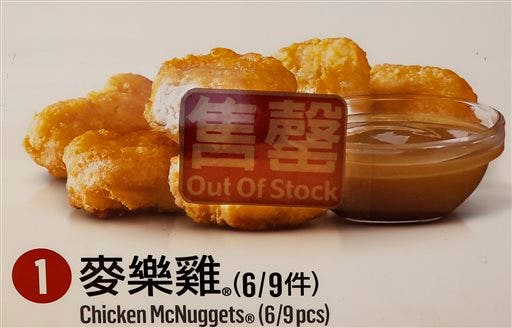Reuters
China's Food Crisis, Again

HONG KONG (MarketWatch) — For foreign food-and-beverage companies, China’s successive food-safety crises have generally been good news. Not only have they boosted sales as Chinese shoppers flock to more-trusted foreign brands, but valuations have also been lifted by a merger spree as Chinese companies headed abroad in the search of safe food.
But as the latest food scandal puts foreign brands in the dock, perhaps investors need to reconsider the risks of the lucrative Chinese food market.
Last week, reports revealed that a U.S.-owned, Shanghai-based supplier to McDonald’s MCD +0.06% and Yum Brands’s YUM +1.35% KFC in China was found to be selling rotten meat. The issue impacted not just McDonald’s restaurants in mainland China, but also in Japan and Hong Kong, with some outlets forced to pull suspect items from their menus.
The instinctive reaction to this latest food outrage is “Here we go again.” In the recent past, China’s menu of food horrors has included chicken with high levels of antibiotics, rat meat disguised as mutton, rice with toxic levels of cadmium, and baby-milk powder laced with the industrial chemical melamine.
Add in everyday concerns about widespread counterfeiting of products, and you have a situation where confidence in China’s food-supply chain has all but collapsed.
This has lead to some unusual distortions in the market. The extent of cross-border shopping for food essentials means you can expect to hear public-address announcements at Hong Kong International Airport warning departing passengers not to breach limits of baby-formula purchases.
Or if you go out for dinner in China, do not be surprised if the waiter opens the beer, as well as wine, at the table. This gesture is to demonstrate the bottle is genuine and has not been tampered with before it got to the table.
Another distortion has led Chinese consumers to favor foreign fast-food groups. KFC’s reputation for being healthy has little to do with the amount of calories in its deep-fried chicken, but rather that it is less likely to make you ill. This is because Yum, which runs 6,000 stores in China, or McDonald’s, with almost 2,000, are expected to bring the same standards of hygiene and quality control as used in the U.S.
The largest and most high profile recent acquisition is that of U.S. pork producer Smithfield Foods, which was bought last year in a $7 billion deal by China’s Shuanghui International, now known as WH Group.
Chinese buyers have also purchased a majority stake in privately held cereal brand Weetabix in the U.K. And last month, Chinese private-equity firm Gondola Group gobbled up another British snack, as restaurant chain Pizza Express was sold for about $1.5 billion.
No comments:
Post a Comment
Comments always welcome!